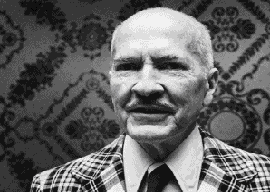
March 30, 2011

Robert A. Heinlein
A touching scene in Patterson’s biography illustrates why Golden Age science-fiction writers and readers so loyally regarded Heinlein as their dean. At a 1941 science-fiction convention where Heinlein was the guest of honor, he took great pains to be a suave host for his awkward fans:
[Heinlein] was probably the most sophisticated and cosmopolitan person the fans had ever come into contact with, and he seemed to them like something out of a movie….Science-fiction readers in 1941 were social outcasts. To be told”seriously”that they were personally an important element in human progress was apparently…intoxicating for them.
With fans this desperate for leadership, Heinlein likely could have set up a personal cult in the manner of his contemporaries, the lesser novelists Ayn Rand and L. Ron Hubbard. (Although unconfirmed, it has been widely reported that Heinlein gave Hubbard the idea of turning Dianetics, originally a low-cost competitor for Freudianism, into the tax-free religion of Scientology.)
Fortunately, Heinlein resisted the temptation to found a cult. He had too much generosity of spirit and too little monomania for the Rand-Hubbard path. Three of his books became cult novels anyway. Tellingly, they each found their way to a different cult. Starship Troopers appeals to militarists, Stranger in a Strange Land to hippies, and The Moon is a Harsh Mistress to libertarians.
Debates over Heinlein today thus resemble the Indian story of the blind men encountering an elephant: One touches its trunk and exclaims that it is a snake, another its tail and calls it a rope, a third its leg and declares it a tree. Depending upon the observer’s cult affiliations, Heinlein is frequently denounced (or lauded) for being an anarchist, a fascist, a Boy Scout, a dirty old man, and so forth.
Heinlein was not an ideologue, but rather a creative artist whose medium was ideas. In his long 1939-1966 prime (his health, always poor, broke down severely after The Moon is a Harsh Mistress), Heinlein became infatuated with many ideas. They were often contradictory, but their dynamic balance made Heinlein not a final authority (as his more callow admirers assumed), but instead an intensely stimulating intellectual provocateur.